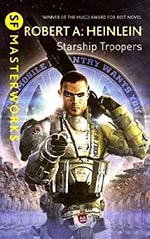
![]() ethawyn
ethawyn
11/27/2010
![]()
After finishing The Forever War, it seemed appropriate to pick up and read the book which, in many ways, had been its precursor. Starship Troopers is considered by many to be the origin of the "space marine" genre (though the titular troopers are actually army) and also criticized by many as being, supposedly, favorable to fascism.
I can't speak for it's views on fascism, but I can see how it started a genre. The book is a fascinating piece of world creation, and chock full of ideas. It's important to know coming in that these ideas are the point of the book. Certainly, Juan Rico, the narrator, is a definite character whose fate you care about, but the narrative is not about an exciting story, and at times gets bogged down in long philosophy or history lectures on the part of his instructors. The first time I picked up this book a few years ago I ended up getting bored with it while Rico was still in training because I'd been expecting an exciting war story.
I really don't see fascism in the book, though it was decidedly pro-military and critical of free democracy. Heinlein dedicates the story to all sergeants everywhere who have labored to make men out of boys." And that, ultimately, seems to be the theme of the story. Juan Rico begins as a young man, unsure of himself, mediocre in school and unthinkingly following his friends, and bit by bit the military takes him away from this.
Finally, it should be noted that the mobile infantry of Starship Troopers is a voluntary corps. The book is critical of conscription armies, and in many ways this is what sets it apart from The Forever War. It's not as simple as Starship Troopers being pro-military and The Forever War being anti-military. The one is about a volunteer army fighting to defend its homeland, the other about a conscript army fighting for reasons unknown. One is Vietnam, the other World War 2. Both authors have interesting perspectives (though I don't agree fully with either) and, though Haldeman did criticize the book for being too pro-military, both share a mutual respect.
This is another one I recommend to pick up. Oh, and I'm told it's nothing like the film.